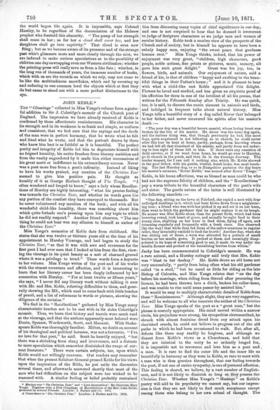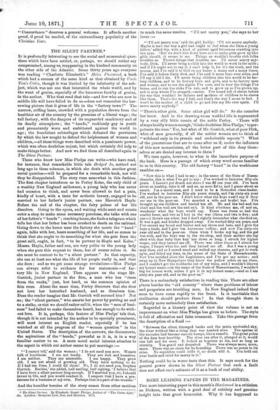JOHN KEBLE.* THE " Gleanings " collected in Miss Yonge's
volume form a grate- ful addition to Sir J. Coleridge's memoir of the Church poet of England. The impression we have already received of Keble is confirmed by these affectionate reminiscences. His character in its strength and in its weakness is so frank and simple, so uniform and consistent, that we feel sure that the sayings and the deeds of the man were in perfect harmony, that he wrote what he felt and lived what he wrote, and that the portrait drawn by those who knew him best is as faithful as it is beautiful. The perfect purity and integrity of Keble led him to depreciate himself with no feigned humility, his entire freedom from literary ambition and from the vanity engendered by it made him either unconscious of his great merit or indifferent to his extraordinary success. Never was a poet more free from a poet's infirmity. Instead of liking to have his works praised, any mention of the Christian Year seemed to give him positive pain. He thought as humbly of it as George Herbert thought of The Temple. "I often wondered and longed to know," says a lady whose Recollec- tions of Hursley are highly interesting, "what his precise feeling was towards the Christian Year, and whether its words gave him any portion of the comfort they have conveyed to thousands. But he never volunteered any mention of the book ; and with all his wonderful child-like humility, there was something about him which quite forbade one's pressing upon him any topic to which he did not readily respond." Another friend observes, "The one thing he could not bear was any allusion to himself as author of the Christian Year."
Miss Yonge's memories of Keble date from childhood. She states that she was twelve or thirteen years old at the time of his appointment to Hursley Vicarage, and had begun to study the Christian Year, "so that it was with awe and reverence for the first poet I had ever seen that I looked at him from the first, view- ing the vicarage in its quiet beauty as a sort of charmed ground where it was a privilege to tread." These words form a keynote to her volume. Miss Yonge writes of the poet and of his works with the utmost reverence and affection, and it is interesting to learn that her literary career has been deeply influenced by her connection with 'Insley. "For at least twelve or fifteen years," she says, "I never did any literary work without talking it over with Mr. and Mrs. Keble, referring difficulties to them, and gene- rally showing the MS., which used to come back with little touches of pencil, and a list of references to words or phrases, showing the diligence of the revision."
We find in the "Recollections" gathered by Miss Yonge many characteristic touches not to be met with in Sir John Coleridge's memoir. Thus, we learn that history and travels were much read at the vicarage, and that the authors apparently most beloved were Dante, Spenser, Wordsworth, Scott, and Manzoni. With Shake- speare Keble was thoroughly familiar. Milton, no doubt on account of his theological and political heresies, was not a favourite. "I've no love for that poet," he said. Scott he heartily enjoyed, "but there was a shrinking from slang and irreverence, and a distaste to mere speculation which somewhat diminished the range of cur- rent literature." There were certain subjects, too, upon which Keble would not willingly converse. Our readers may remember that when the present Solicitor-General pressed Keble for his views upon the inspiration of the Bible, he put aside the discussion several times, and afterwards answered shortly that most of the men who had difficulties on this subject were too wicked to be reasoned with. A similar feeling or belief probably restrained
• Musings over " The Christian Year," and "Lyra Innocentiuns". By Charlotte Mary Yonge. Together with a Few Gleanings of Recollections of the Rev. John Kahle, gathered by several Friends. London: J. Parker and Co. 1871.
4 Concordance to "The Christian Year." London: J. Parker and Co. 1871.
him from discussing many topics of chief significance in our day, and one is not surprised to hear that he deemed it irreverent to judge of Scripture characters as we judge men and women of secular history. Keble took a sombre view of the prospects of the Church and of society, but in himself he appears to have been a. calmly happy man, enjoying "the sweet peace that goodness bosoms ever." Miss Yonge thinks, indeed, that his power of enjoyment was very great, "children, high characters, good people, noble actions, fine prints or pictures, music, scenery, all gave him such great delight." Great was his joy, too, in flowers, birds, and animals. Our enjoyment of nature, said a friend of his, is that of children "happy and exulting in the beau- tiful things in their Father's house ; " and it is pleasant to hear with what a child-like zest Keble appreciated this delight. Flowers he loved and studied, and has given an exquisite proof of his affection for them in one of the loveliest of all his poems, that. written for the Fifteenth Sunday after Trinity. He was quick, too, it is said, to discern the comic element in animals and birds, and indulged in frequent talks about natural history. Miss Yonge tells a beautiful story of a dog called Rover that belonged/ to her father, and never recovered his spirits after his master's death
The poor dog was a beautiful brown spaniel, whose loving heart was broken by the loss of his master. He never was the same dog again,. and the curious thing was, that though previously he had, like most dogs, quite acquiesced in not following us to church, he could never after this loss be kept at home, partly, perhaps, from. knowing where we had left all that remained of his master, and partly from not endur- ing to lose sight of those left to him. If there were any cessation of daily service, or if we went from home, he would go over to Huraley, go to church in the porch, and then lie in the vicarage doorway. The tender respect, for I can call it nothing else, which Mr. Kahle showed to the poor fellow, with his gentle, wistful, dumb looks, was most touch- ing. The last Hursley dog, or as in Hampshire parlance the dog bears his master's surname, 'Rover Kahle,' was named after Rover 'Yonge.'" Keble, in his home affections, was as blessed as man could be who had not the supreme felicity of children, and the " Recollections' pay a warm tribute to the beautiful characters of the poet's wife and sister. The gentle nature of the latter is well illustrated by the following anecdote :— One day, sitting on the lawn at Fairford, she espied a nest with four unfledged nestlings in it, which had been blown down from a neighbour- ing tree ; a friend who was with her picked it up and set it on her knee, then went to fetch the gardener that he might replace it on its bough. No sooner was Miss Keble alone, than the parent birds, which had been hovering round, took heart of grace, and actually brought food to their young ones, alighting on her knee to feed them, flying off again, and returning regularly and frequently with a fresh store. She observed (by the way) that while they fed three of the callow creatures in regular order, they invariably omitted to feed the fourth ! Another day, when she was sitting out of doors, a wren was attracted by a pattern of small berries on her muslin gown. It pecked at them, and seemingly disap- pointed in its hope of something good to eat, it made its way under the muslin flounce and pecked at the tantalizing berries from within."
Jacky has been commemorated in Coleridge's memoir. He was a rare animal, and a Hursley cottager said truly that Mrs. Keble was "blest in her donkey." Mr. Keble drove an old horse not very successfully, "partly from being often what his old gardener called 'in a stud,'" but he cared as little for riding as the late- Bishop of Calcutta, and Miss Yonge relates that "on the day before his marriage, when riding from Stroud after procuring the licence, he had been thrown into a ditch, broken his collar-bone, and was unable to rise until some passer-by assisted him."
It would be easy to multiply characteristic details of Keble from these "Reminiscences." Although slight, they are very suggestive, and will be welcome to all who venerate the author of the Christian Year. Miss Yonge speaks of the poet as a "great man," but the phrase is scarcely appropriate. His mind moved within a narrow circle, his prejudices were strong, his sympathies circumscribed, he shrank with almost feminine dread from any attack upon his. cherished creeds, he could not believe in progress out of the old paths in which he had been accustomed to walk. But, after all, defects like these may readily be forgiven, and although we dissent from Keble's views as a Churchman, and hold that they are inimical to the unity he so ardently longed for, it is impossible not to reverence and love him as a poet and a man. It is rare to find the outer life and the inner life so beautifully in harmony as they were in Keble, so rare to meet with a man who is thus genuine throughout, that our feeling towards the poet, if not one of entire sympathy, is one of personal affection. This feeling is shared, we believe, by a vast number of English- men, and it is not likely to diminish so long as they possess the Christian Year. Whether Miss Yonge's " Musings " on Keble's poetry will add to its popularity we cannot say, but our impres- sion is that they are not likely to find much acceptance except among those who belong to her own school of thought. The proof, if proof be needed, of the extraordinary popularity of the Christian Year.



































 Previous page
Previous page